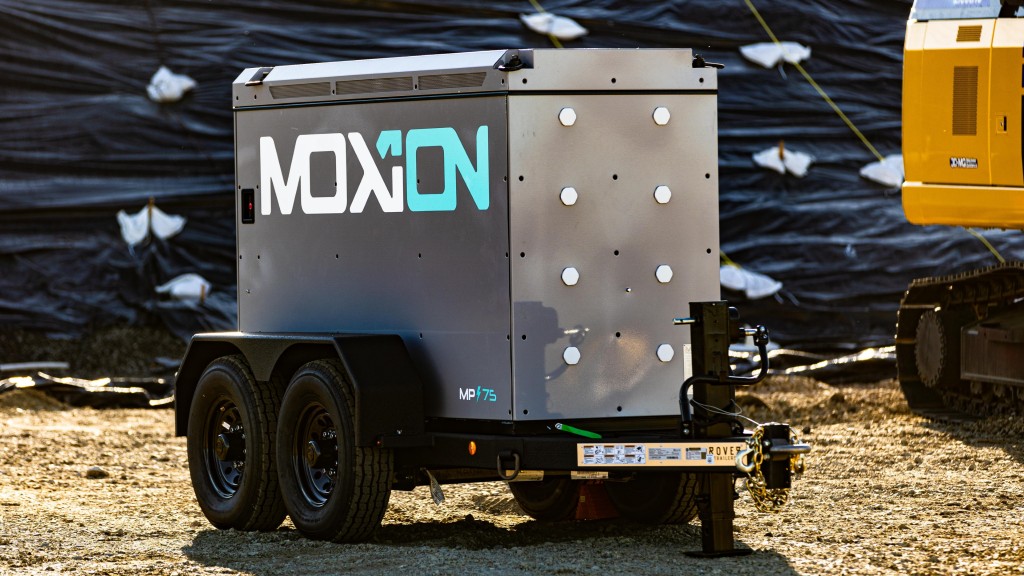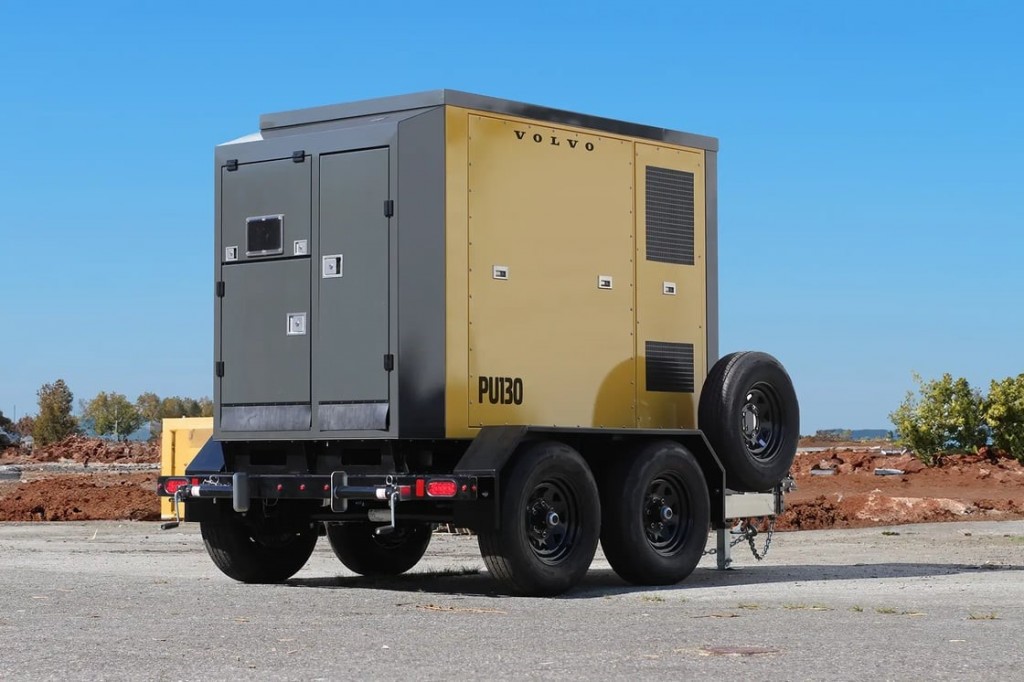Portable battery packs and electric equipment prove a powerful pair
On-site battery storage units cut emissions and provide flexible charging for electric construction machines and job site tools

The emergence of battery-electric earthmoving equipment comes with some barriers that can slow adoption. Charging is one big challenge – contractors are wary of purchasing machines when they don't know how they will charge their equipment from day to day without transporting it from job sites to power source.
While diesel generators can be an option when there is no grid connection available, they also produce emissions, which offset the benefits of electric machines. For contractors seeking true zero-emission operation, portable energy storage is the solution they need.
Portable energy storage – similar to a generator but containing batteries rather than an engine – is still new, but growing as an option that can both provide a charging point for electric earthmoving machines as well as a power source for other job site needs such as lighting, security, or power tools.
Alex Meek, co-founder and president of Moxion Power, sees incredible potential for portable energy storage in the construction sector. Moxion has proven its technology through successful pilot deployments with several major equipment manufacturers which showed the strengths of portable energy storage.
Power limitations drive energy storage development
According to Meek, Moxion was founded in the wake of the devastating 2020 fire season in California, when 4.4 million acres of the state burned, destroying thousands of buildings and frequently disrupting power utility operation.
"I was on a hike with my now business partner and we noticed the diesel generator powering the water utility pumps up on a fire trail, and we asked the question – ‘Why is this here, and isn't there a better solution that can support providing temporary power?'" he recalled.
Since then Moxion has produced roughly 750 battery storage units, with the milestone of 500 megawatt hours of storage in its sights. Live concerts, sporting events, and filming locations have benefitted from portable energy storage units, and construction sites have picked up the concept as well, replacing generators to power job site trailers, perimeter lighting, and more.
The Moxion MP75/600 mobile unit uses lithium-iron-phosphate (LFP) batteries, which Meek says are safe and reliable, and are becoming a more popular choice for electric vehicles.
Portable storage units like the MP75/600 are mobile and can be easily towed to job sites, providing a zero-emission power source to replace diesel generators at remote locations where no power grid access is available.
"We can support charging whether it's a Level 2 charge or a DC fast charge – for the most part our 600 kWh battery pack is more than enough to power some of the largest battery packs you see in construction today," he says.
Level 2 charging runs on currents from 12 to 80 amperes, while DC fast charging – using direct current, rather than the alternating current of Level 1 and 2 – tops up batteries far quicker.
Full-size Komatsu excavator charged by Moxion battery pack
That has been put to the test on multiple job sites. Komatsu has been demonstrating its 20-ton PC210E all-electric excavator in various locations, including on the construction site where Moxion is building its new manufacturing facility in Richmond, California. Meek says the demo required a transformer to convert to a European charging standard on the excavator, but once that challenge was met the PC210E was able to do a full 8-hour day of excavation work on an overnight charge supplied by the Moxion battery storage.
Moxion, through its partner Sunbelt Rentals, also provided power for a pilot of Volvo's EC230 electric excavator on a project for Turner Construction in 2023. The 23-metric-ton excavator handled a variety of jobs, including utility placement, excavating building pads, and backfilling, and with a full charge was able to run five hours producing zero carbon emissions.
Crane rental supplier Bigge has also gotten into the mix, partnering with Moxion to provide off-grid power for its recently acquired Liebherr LR 1250.1 unplugged crawler crane. As part of its efforts to power the 275-ton crane with as few emissions as possible, Bigge is installing solar panels at its San Leandro, California, headquarters to provide a clean power source on site. When the cranes are unable to return to the shop from the job site, Bigge will use Moxion mobile units to top up the crane on-site.
Battery-electric heavy equipment immediately reduces emissions on the job site, and using battery storage as the main energy source for charging cuts emissions even further. Portable energy storage can substitute for a diesel generator with minimal operator training. Once the learning curve has been negotiated, job sites generally see longer run times from battery units compared to generators, Meek notes.
Multiple ways to replenish portable energy storage
Recharging the battery pack can be done on-site if there is grid or temporary power connection, allowing for trickle or overnight charging when the unit is being taken to and from electric machines that are working too far from the power source to be parked for charging overnight, for example. Alternately, the battery may be paired with a traditional generator that is run occasionally to top up the charge. Meek says generators tend to run between 70 and 90 percent less in that role.
A third option is to swap the towable portable pack with another – one charges at the shop, one powers the site, and the two are towed in and out as necessary.
The MP75/600 has an operating temperature range from 49 degrees C down to –12 degrees C. Beyond those temperatures, the batteries will likely not have full energy capacity. "It's meant to support some more extreme weather conditions, but certainly there can be challenges," Meek says. "Long-term, our future products are going to help support that, so ultimately you've got products that are very capable and reliant no matter the conditions."
Moxion is advancing compliance and certification efforts so its products can operate in the Canadian market. Meek expects that process to be completed in late 2024 or early 2025.
While portable energy storage solutions come at a premium when compared to diesel generators, reduced running costs over time bring the total cost of ownership down. When paired with emissions savings, Meek says the potential benefits are significant.
"Decarbonization is a big pull for our products and technology," he adds. "You have this double whammy of a better, more efficient product that is at the relative same price point or all-in total cost of ownership, and you have the benefit of reducing carbon emissions and meeting those goals that are, often, becoming a priority or a requirement."



